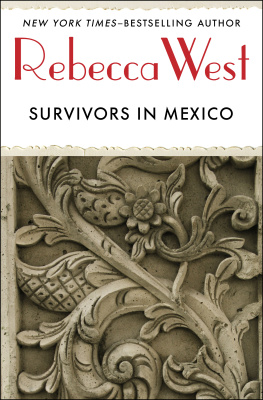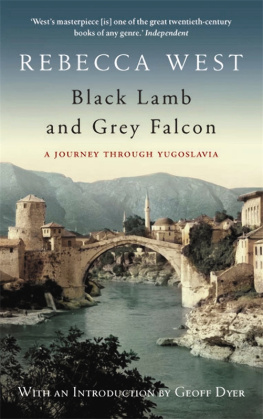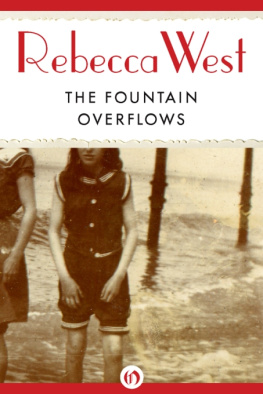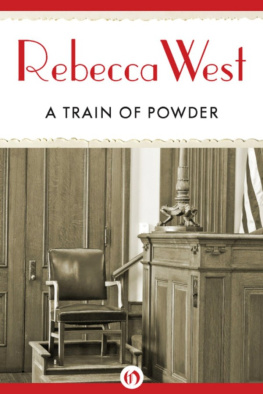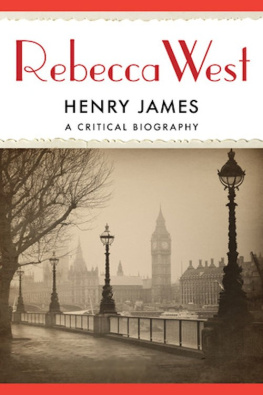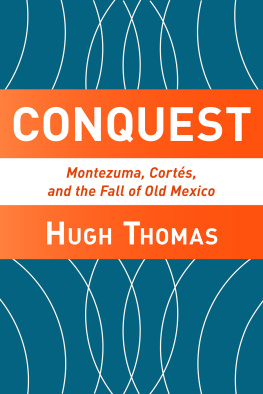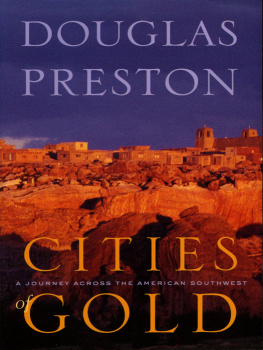Survivors in Mexico
Rebecca West

To
Lori Curtis and the
McFarlin Special Collections Library at the University of Tulsa
Contents
THIRTY YEARS AGO, in the Macedonian province of Yugoslavia, I knew one of the last pashas who were stranded there after the Turkish Empire had been driven out of the Balkans. Such Turks were in sad straits. Five hundred years before, their ancestors had been settled there by the sultans to colonise the territories their armies had conquered, and now the Christians had turned on them, and they were amazed, as exploiters always are when the exploited turn and bite the hand which has not fed them. There was nowhere for these obsolete pro-consuls to retreat from this revenge, for they were strict Moslems, the women wore the veil and the men the fez, and they knew that if they went back to Turkey they would find that by order of the Atatrk the Turkish females faces were naked and Turkish males had adopted infidel bowlers.
Therefore the old pasha, like several of his kind, lingered on in Macedonia, living in the crumbling villa-palace of his ancestors, with only the few acres round it that he had been allowed to keep when the rest was cut up into peasant holdings under the land reforms of King Alexander. The one place in his home where his poverty did not show, where there were no cracked tiles on the floor and no plaster dust fallen from the wedding-cake vaults above, was a second-storey balcony, which the old lilac trees in the garden had long overtopped. Sitting there, one could stretch out an arm into the branches and stir up the purple flowers and set the scent rising in clouds. There we used to pass the summer evenings, up among the lilacs, drinking a mixture of coffee and chocolate, not thick Turkish coffee, but the thin Western brew, laced with sweet chocolate beaten to a foam. This, the pasha told me every time we drank it, is how they serve coffee in Mexico. That was the only thing about Mexico I was sure I knew when I went there.
It is in line with life as I know it that when I got to Mexico nobody had ever heard of mixing coffee and chocolate. But my misapprehension worked out well, for Mexican waiters always took an interest in my husband and myself after we had ordered this bizarre beverage, saying, Chk, chk, do they drink that in England? and when we said, to save ourselves trouble, Yes, all the time, all the time, they nodded tolerantly, feeling that as foreigners we had to be wrong about something, and this was error in an innocent field. So they bore with us every afternoon, round about six, when we went up to the bar on the top floor, though that was the hour they liked to doze; and while they stretched themselves on the plush benches round the walls, we sat undisturbed by the huge west window and watched the sunset make a cavalry charge on the sky and beat the daylights out of it and then itself get beaten by the night.
The conflict might go this way: above Mexico City the November skies were pearl grey, not luminous as might be expected at the height of seven thousand feet, not trembling brightly as they do over Johannesburg and Saint Moritz, for the reason that here they are thickened and sobered by industrial pollution contained within the walls of the wide basin in which the city spreads. These pearl-grey skies became a honey-coloured vagueness, a primrose glow, an amber fire, orange flames, and it is no use objecting that this process happens everywhere at that hour. Only here does it seem that the skies go on fire as solid objects do, as if their ashes might rain down on the spectators. Then the mountains were black against crimson, and the crimson marched on and on until it was overhead, and then purple clouds rushed from horizon to horizon, fusing with the crimson and dissolving to rose veils floating on a mulberry firmament, which then was bleached, but brightly, into a greenish crystal arch traversed by white phantoms of mist through which shone stars larger than they had been last week in New York. Lights twinkled up at them from the city below, and it was full night. The operation had taken twenty-five minutes.
The lights that twinkle back from Mexico City are sparse. Over Washington and New York and other urban complexes in the States there stand in the night other shining, immaterial cities, created by profligate use of electricity: a lovely form of waste. But Mexico is huge and poor and profligate only in fields indicated by its political soul, which acts (like even the best of governments) half out of a genuine desire to promote the happiness of the people and half to catch votes.
The Federal District of Mexico contains 6 million people who have to be kept happy, not including the half-million provincials camping in the dust-flats outside the city limits, waiting for jobs they have imaginedwhich is not so hopeless a state as might appear. Mexicans have a creative imagination. They might imagine prosperity into being. They have imagined themselves into the present United States of Mexico against all probability; they have imagined the huge solidity stretching for miles below the glass window where we sat, a solidity which at that hour was dense not only where there were houses, but in between. A seventh of the national population lives within the Federal District; to take a larger unit, nearly half that population is to be found in the 14 percent of the national territory contained in the wide basin of the Valley of Mexico. As my husband and I sat looking at the sunset, most of that half were trying to get home. Below us was a traffic congestion startling even to those who know New York and London and Paris.
There has only just been built the beginnings of a subway in Mexico City, and the reason for thislike the reason for everything that happens in these partsis historical. In 1521 the Spanish conqueror Corts destroyed the Aztec capital, Tenochtitln, which was another Venice, poised on silt in a lake, and he built Mexico City on the ravaged site. In the process he rashly drained channels which should have been left alone, and the water table shifted and has never been quite itself again, so solid earth round here is not so solid. Many old buildings have a heavy list, often with ironic effect. Surely the offices of the Congregation for the Propagation of Faith ought not, with its influential connections, to be sinking into the ground at an angle of twenty degrees. So it happens that no engineer was eager to build a subway anywhere near Mexico City, and till now there has been no public transport except buses and two kinds of taxis, one the kind for hire by a single passenger or acquainted group of passengers, the others who take a mixed bag and drop them in turn. The drivers of this latter sort show what they are by putting one hand out of the window when they have room for another passenger, and it becomes a folk gesture peculiarly appropriate to the town.
They are Mexican hands, more often beautiful than not. (It is only we Europeans who have ugly hands, with thick fingers, broad palms, heavy wrists, and an alarming liability to go uglier still in age. No wonder we have had to excuse ourselves by technological activity.) Mexican taxi drivers hands, like everything else Mexican, are involved in history. By day they are asking for more passengers, and avidly, for there is poverty here, but they are also pointing out the scenes on which their national drama has played itself. Listen to one of the drivers who can speak a foreign language and ferries tourists to whom that language is native: he will not be difficult to hear, he will be giving forth that open-mouthed shout which in all countries is the voice of nationalism: That marble colonnade is a memorial to OUR GREAT STATESMAN JUREZhe was NOT A SPANIARDhe was an INDIANan INDIANa PURE INDIAN a ZAPOTEC INDIANhe came from OAXACAare you listening, Maam? THE PARK BEHIND IS ONE OF OUR MANY BEAUTIFUL PARKSit is called the Alamedathe Poplar Park. HERE THE AZTECS HAD A GREAT MARKET where they sold everything, Neiman-Marcus nothingthey sold GOLD AND JADE AND CLOTH MADE OF FEATHERSand CHOCOLATE AND VANILLAbut when the Spaniards came they STOLE it alland the merchants they KILLEDand when the Dominicans came they turned it into the CREMATORIUM Squarethere they BURNED ALL THE VICTIMS OF THE INQUISITIONhuman sacrifices they said the Indians madebut human sacrifices they were few, they were nearly nothingBUT THE INQUISITION IT BURNED AND BURNED AND BURNED. The substance of the polemic is slightly surprising to the foreigner, because the speaker is unlikely to be a pure Indian. Of the 40 million Mexicans alive today only 29 percent are Indian, and most of them live in the country. Of the remainder 15 percent are white, 1 percent negro, and no less than 55 percent mestizos, of mixed blood. The man is not denouncing some monstrous invader of his peoples lands, as Poles might denounce the Nazi Germans; he is denouncing some of his ancestors for maltreating other of his ancestors, which, as he is both, must lead to schizophrenia. Yet he glows with health. He is a strong swimmer swimming with the tide which is gathering momentum. Never did the Indians, during their centuries of subjection to the Spanish, lose their pride of race; but probably these taxi drivers grandfathers could not have delivered these crowded and coherent impromptu lectures, for lack of substance. That was delivered to their sons and grandsons in superbly assimilable form by, they think, just one person. But you will read ALL OUR GLORIOUS HISTORY in the murals of DIEGO RIVERA. You have seen them? IN OUR NATIONAL PALACE. IN CUERNAVACA. IN THE MINISTRY OF EDUCATION. He was OUR GREAT MAN, Diego RIVERA. There is an enchanting paradox here. Because Rivera was a member of the Internationalist Communist Party he became the most persuasive nationalist propagandist ever known. If Hitler had had such a painter on his side I and millions of others would not be alive today.

